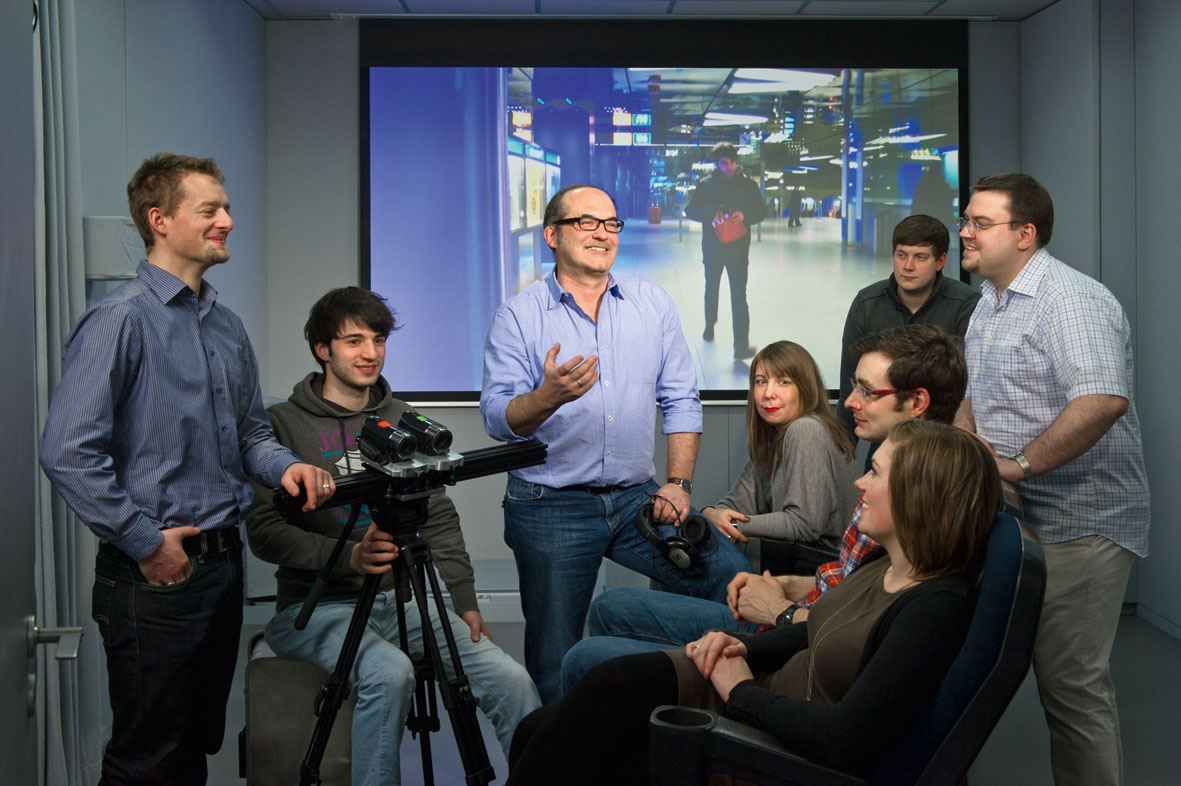Creative teaching:
Prof. Klaus Diepold is "on board"

TUMstudinews: TUM is the first university in Germany to reward university lecturers who practice particularly creative teaching. You are one of them – and are now able to take a teaching sabbatical. What is so different about your lectures?
Klaus Diepold: We enhance the conventional "talk and chalk" style of teaching. Students need to actively produce, and not just passively adapt. Creative, independent thinking is important to me. I want to confront the students with realistic problems.
TUMstudinews: How do you prepare your lectures?
Klaus Diepold: 30% of my lessons are improvised. Quite often, I just try out something and see if it works or not. Of course, this also means relinquishing control, letting the students surprise me. It does sometimes get chaotic, but the students are resilient and put up with it. 30% of the lesson is all about innovation, things I am interested in myself. I want to learn something, too! I'm in the "learning boat" as well. It's my fountain of youth, so to speak.
TUMstudinews: How did the concept evolve?
YKlaus Diepold: I often realize that the students have a problem to close the gap between theory and practice. The often show excellent theoretcial knowledge, but they don't understand what this means in practical life.
For example, they can mostly recite the sampling theorem but they are unable to identify in a picture where this theorem is violated.
TUMstudinews: You work with "active teaching" methods – what are they about?
Klaus Diepold: My wife studied social work a few years ago and introduced me to these methods. At home, we often discussed ways to capture pupils’ and students’ interest and inspire them more. The main idea is that those at the learning end should acquire knowledge themselves. In our capacity as teachers, we only give incentives, advise and support them.
TUMstudinews: Your students often work in teams. They learn what it means to tackle tasks as a group and to cooperate to find sol utions at quite an early stage.
utions at quite an early stage.
Klaus Diepold: In my seminars on digital video signal processing, the young people get together in teams to create 3D films or develop software for producing them. They don't just solve mathematical problems by reproducing theoretical knowledge. Even the Bachelor students create and implement solution methods for real engineering problems for which there is no standard solution yet.
TUMstudinews: The TUM principles for effective teaching and learning http://portal.mytum.de/studium-und-lehre/lehrpreise/leitbildstate that students share the responsibility for their studies - by taking part in courses, following these up and giving constructive feedback, for instance.
Klaus Diepold: Feedback is very important to me – direct dialogue. And sometimes the students take over my role. They teach each other. They present their knowledge to one another - using posters, like at scientific conferences, for example.
TUMstudinews: What do the students think of your methods?
Klaus Diepold: We have a really stable "fan base". 80% stay with us for their Bachelor's thesis – mostly very dedicated students who are not only curious but also willing to perform, because dedication costs time. I am always amazed what the students can manage. Sometimes, talents emerge that would normally never have been discovered during a degree course. For example, a student made a great movie trailer for the "Digital Video" lecture series.
TUMstudinews: What does the award of the TUM's teaching sabbatical mean to you?
Klaus Diepold: The award is a perfect move. There are no "brownie points" for good teaching, just time. Time is the greatest gift of all. Sabbatical leave is a gift of time. I have no teaching to do for a whole summer term.
TUMstudinews: What will you do during the free semester?
Klaus Diepold: I developed the "Digital Video" course in conjunction with two like-minded colleagues, Martin Rothbucher and Christian Keimel. Both are infected by the same virus as I am. Now we will think up some new ideas for the winter semester. I am also writing an accompanying manual and developing new software tools.
TUMstudinews: How can scientists become better teachers?
Klaus Diepold: University lecturers should compare notes and interact with one another more. In our department, we introduced a new "Teaching Espresso". We meet up informally for coffee and swap ideas about teaching practice. More collegial advice would be great. The subject of teaching is not discussed very often.
Prof. Dr.-Ing. Klaus Diepold studied Electrical Engineering and Information Technology and earned his PhD at TUM. He then worked in Munich, Oslo and New York as a scientist and entrepreneur in the video and television industry. He spent over ten years co-developing MPEG standards (MPEG-4, MPEG-A). Since 2002 he has held the position of Professor of Data Processing at TUM. He taught in Canada and Australia as a guest professor. He serves on the board of the Center for Digital Technology and Management (CDTM) as well as the board of the "Cognition for Technical Systems" Cluster of Excellence (CoTeSys).